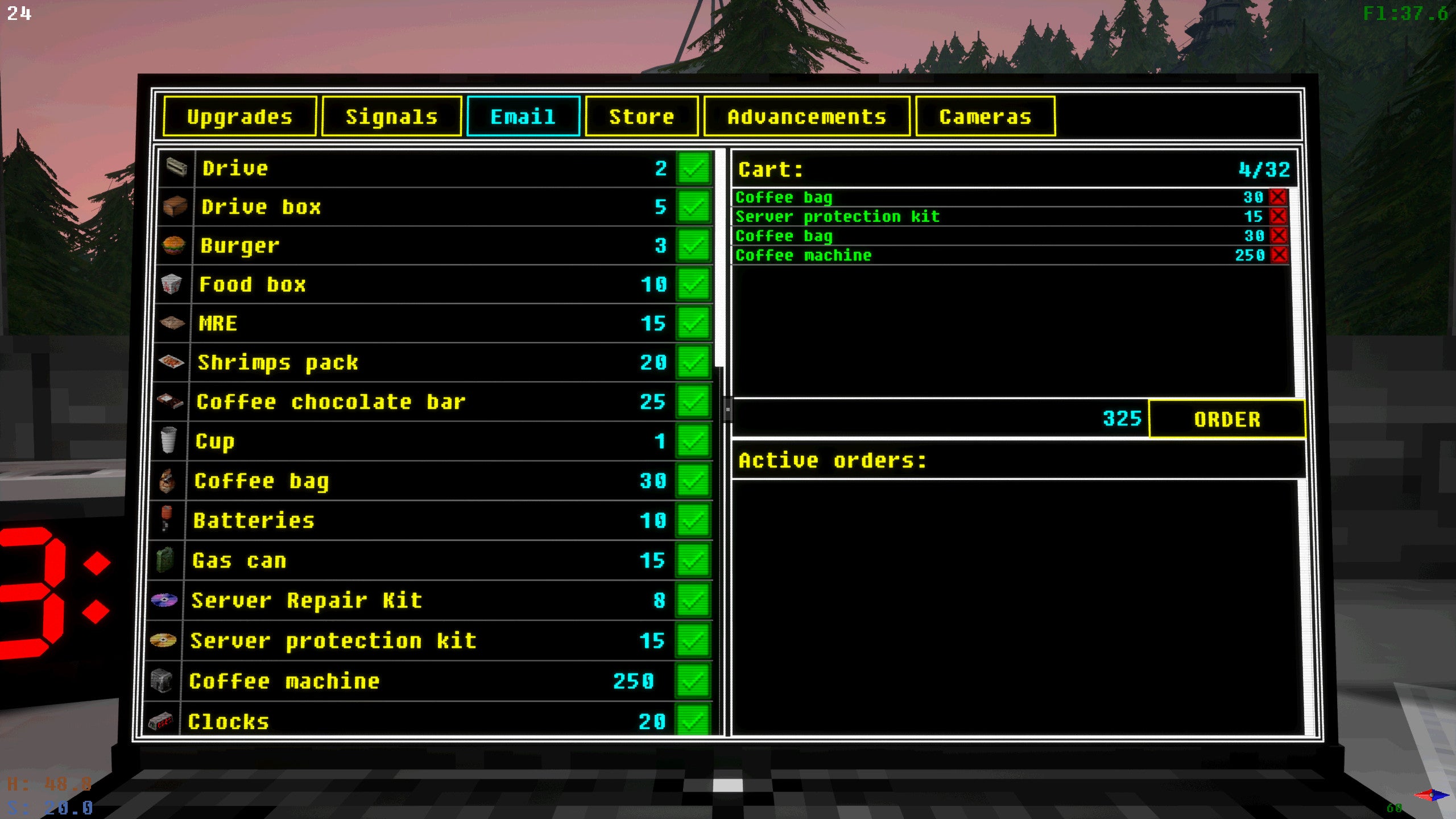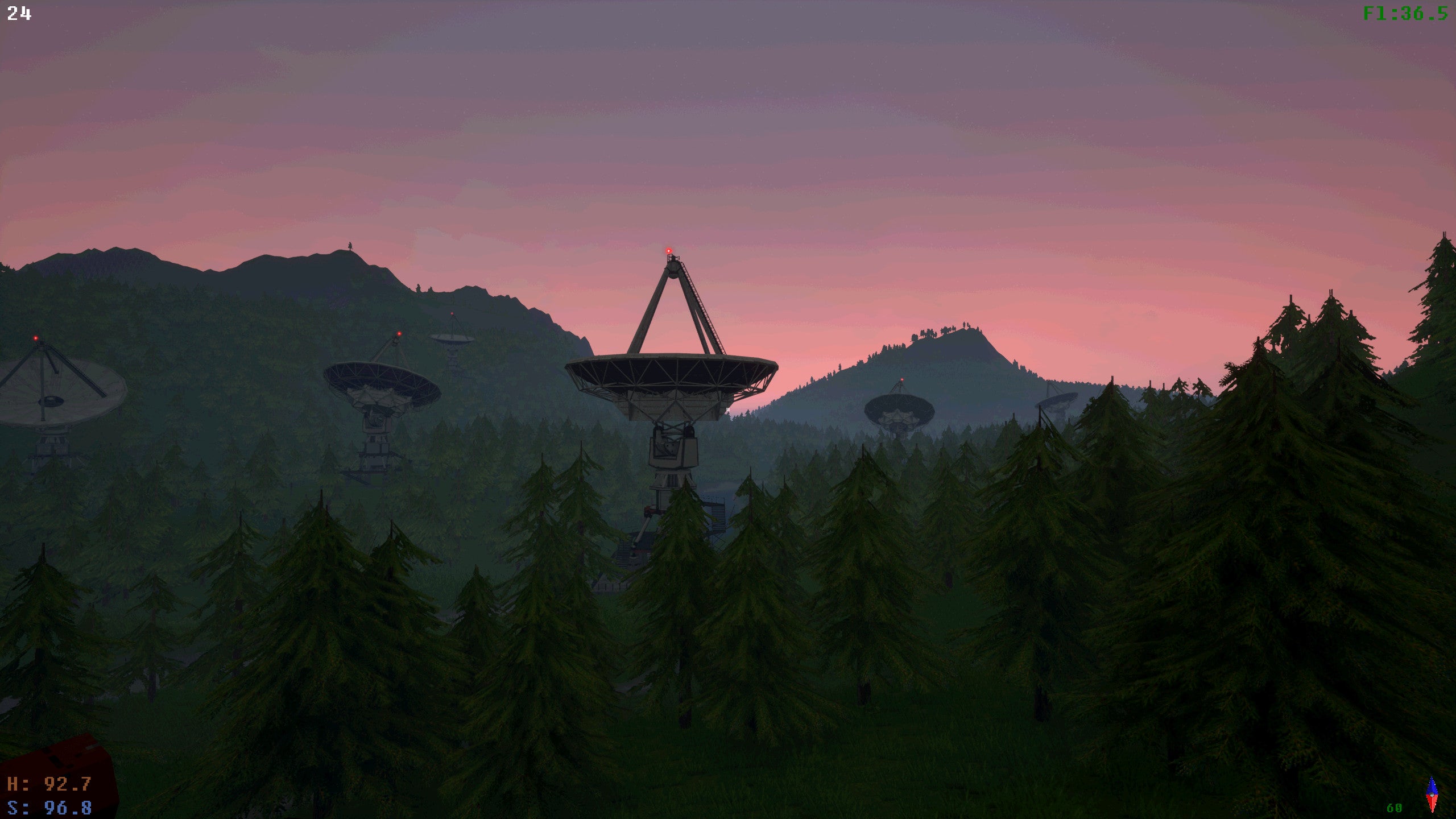Voices Of The Void sends you to work at a radio telescope array in Switzerland, a fairy ring of dishes rising above the trees. Your job is to find, record, and analyse intergalactic objects, then sell the data, plus keep the whole place running. It’s nice and slow yet very involved. The basics of your job involve a bank of four computer terminals and a laptop, each with their own role, display, and controls. Most of the controls are physical buttons, pressed and tweaked and tuned. Data is stored on physical drives too, shuffled around between stations by ejecting the drive and slamming it into another slot (after remembering to export, obvs). Individual computers in your server bank can break, reducing your processing power and slowing systems until you rewire them in a wee minigame with basic maths puzzles. Worse, computers inside dishes can cut out, and you’ll need to run all the way over (or hop on your janky quad bike) to reconnect it to the network. You’ll also do a lot of maintenance by manually typing commands into terminals to analyse and recalibrate systems. And if you really want to optimise your workflow, you can boost power by turning off unused systems at the breaker; I absolutely refuse to go without lights. As a known fan of fiddling with objects, I very much enjoy the many processes of pressing physical buttons on computers, typing commands into terminals, throwing switches, dragging around drives, refuelling from cannisters, and so on. It feels Half-Life 2-ish, especially because I think it’s currently using some HL sounds. After the tutorial, the game drops all support and is happy to let you bumble around and figure everything out, which I like. It’s pleasurable to master this job, to come to perform the process as matter of habit, to know how to find and fix problems, and to learn the layout of the valley I now live in. It is also a mild daily life simulator, with day and night cycles plus hunger and tiredness to manage. And each day, your boss will e-mail tasks with opportunities to earn extra funds. You’re in charge of upgrading all the individual systems too, see, using the money you earn. And while you get a daily drone delivery with a new drive and a bag of crisps, you’ll also want to buy extra supplies and handy luxuries. It’s a big job for one person. Alone. In the woods. Voices Of The Void is a suspenseful game. The setup instantly made me think of Five Nights At Freddy’s and woodland Slender Man jumpscare ’em ups, but it’s not like that (though I did nope real hard upon finding mannequins inside my base). It’s a slow, creeping unease of focusing on an otherworldly task, alone, at night, hoping you won’t see something out the corner of your eye. Every time I watch dishes rotate out the window, I try to avoid seeing between the trees, just in case. This tension can be joyful too. Every peach-coloured dawn is a relief. And when a shower of rain coincided with a meteor shower, I rose from my bed and ran into the night to gaze up and spin in wonder. But I’m increasingly encountering moments of… not quite horror, not yet, but certainly dread. I fear worse is to come as I progress through the story mode’s days. I hate that my command centre has a radar console pinging away in a corner. And I hate that the console has a button to reset an alarm. What’s the scanner for, game? Why might an alarm go off? It’s that very good thing in games: revealing a system to you before you need it, creating anticipation/curiosity/dread about when and how it might come into play. Maybe it never will. I hope it never will. I like when games are unconventional enough that I never feel I have a firm handle on what they are. Without comforting knowledge of genre conventions, it could be anything, so I tie myself in anxious knots imagining everything. It’s the same feeling I had playing excellent infrastructure inspection game Infra. And now my brain is running wild imagining what Voices Of The Void could do. I would flip my very lid if the daily drone delivery ever happened to, you know, just casually give me a gun for no reason, don’t worry about it, just a gun in with my groceries. I have no reason to believe that it has guns or will ever turn violent. But what if it did drop me a gun. Oh no. Voices Of The Void is still a work in progress. The controls are odd, with some key combinations and input orders often leaving me fumbling and flinging items. The tutorial riffing on Portal seems odd, setting expectations of a tone that the rest of the game doesn’t seem to have at all. It feels a mistake to start you off without every computer terminal unlocked, requiring a bit of work to buy the final step of the standard signal process. I don’t like the HUD, especially not with the black borders that are on by default (you can turn them off). But it’s not worth quibbling too much at this stage of development. I am excited to see what this game will become, and I dread experiencing it all. You can download the latest pay-what-you-want (with no minimum) demo build from Itch.io. The developer, MrDrNose is helping fund it through a Patreon. Ooh and only as I finish writing this post do I learn of an older game with a similar premise, Signal Simulator. Looks shinier and more high-tech, that, and a lot more complicated. I quite like that Voices feels like a low-fi Half-Life 2. But I’ll have to give that one a peek too.

